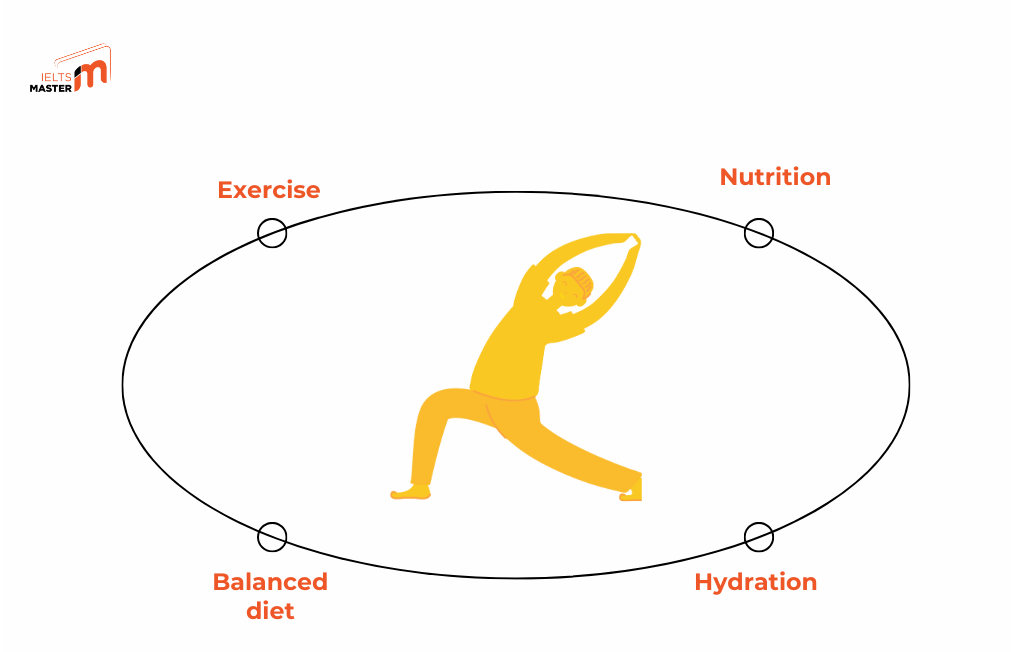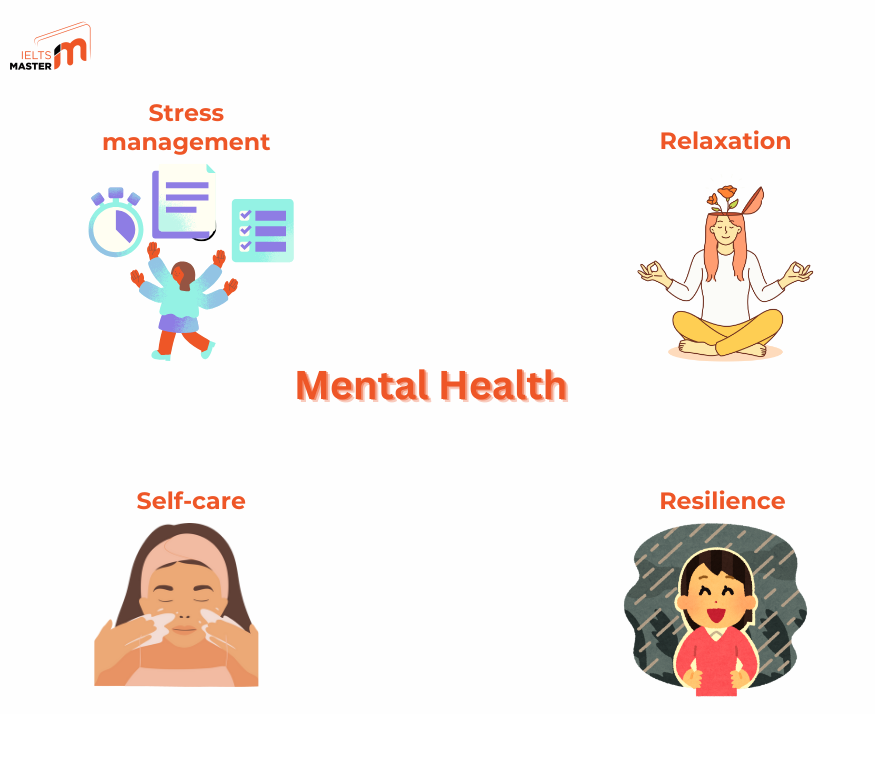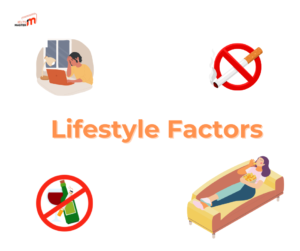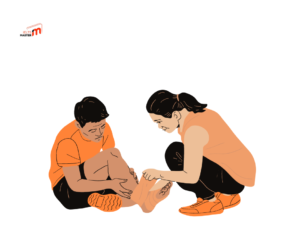Bài viết này cung cấp một bộ từ vựng IELTS toàn diện về chủ đề Sức Khỏe (Health), bao gồm các khía cạnh như lối sống lành mạnh, bệnh tật, hệ thống chăm sóc sức khỏe, các vấn đề sức khỏe toàn cầu và các biện pháp phòng ngừa. Bằng cách nắm vững những từ vựng này, bạn sẽ tự tin hơn trong việc diễn đạt ý kiến, mô tả vấn đề và đưa ra các giải pháp liên quan đến sức khỏe trong bài thi IELTS Speaking và Writing.
Physical Health (Sức khỏe thể chất)

Dưới đây là một số từ vựng và cụm từ liên quan đến chủ đề Physical Health (Sức khỏe thể chất) mà bạn có thể sử dụng trong IELTS Speaking:
Exercise (Tập thể dục):
- Physical activity: Hoạt động thể chất
- Workout: Buổi tập luyện
- Training: Luyện tập
- Fitness regime: Chế độ tập luyện
- Cardio: Bài tập tim mạch
- Strength training: Tập luyện sức mạnh
- Flexibility: Sự dẻo dai
- Endurance: Sức bền
- Warm-up: Khởi động
- Cool-down: Thư giãn sau khi tập
Nutrition (Dinh dưỡng):
- Nutrients: Chất dinh dưỡng
- Vitamins and minerals: Vitamin và khoáng chất
- Macronutrients: Chất dinh dưỡng đa lượng (protein, carbohydrate, chất béo)
- Micronutrients: Chất dinh dưỡng vi lượng (vitamin, khoáng chất)
- Dietary fiber: Chất xơ
- Protein: Chất đạm
- Carbohydrates: Tinh bột
- Fats: Chất béo
Balanced diet (Chế độ ăn uống cân bằng):
- Healthy eating: Ăn uống lành mạnh
- Wholesome food: Thực phẩm lành mạnh
- Portion control: Kiểm soát khẩu phần ăn
- Calorie intake: Lượng calo nạp vào
- Dietary guidelines: Hướng dẫn chế độ ăn uống
- Food pyramid: Tháp dinh dưỡng
Hydration (Cấp nước):
- Water intake: Lượng nước uống vào
- Dehydration: Mất nước
- Fluid balance: Cân bằng chất lỏng
- Electrolyte balance: Cân bằng điện giải
Các cụm từ khác:
- Physical fitness: Thể lực
- Physical well-being: Sức khỏe thể chất tốt
- Sedentary lifestyle: Lối sống ít vận động
- Active lifestyle: Lối sống năng động
- Weight management: Quản lý cân nặng
- Preventative healthcare: Chăm sóc sức khỏe dự phòng
- Chronic disease: Bệnh mãn tính
- Get enough sleep: Ngủ đủ giấc
- Maintain a healthy weight: Duy trì cân nặng hợp lý
Ví dụ ứng dụng trong IELTS Speaking:
-
Part 1:
- Question: What do you do to stay physically healthy?
- Answer: I prioritize physical activity by going to the gym three times a week, where I do a combination of cardio and strength training. I also try to eat a balanced diet rich in fruits and vegetables, and I make sure to drink plenty of water throughout the day.
-
Part 2:
- Cue card: Describe a time when you made a positive change to your lifestyle.
- Answer: Last year, I decided to adopt a healthier lifestyle. I started by cutting back on processed foods and incorporating more whole grains and lean protein into my diet. I also began a regular exercise routine, focusing on cardiovascular exercise and strength training. These changes have significantly improved my physical fitness and overall well-being.
-
Part 3:
- Question: What are the benefits of a healthy lifestyle?
- Answer: A healthy lifestyle offers numerous benefits, such as increased energy levels, improved mood, reduced risk of chronic diseases, and a longer, healthier life. It can also lead to better mental health and stress management.
Mental Health (Sức khỏe tinh thần)

Stress management (Quản lý căng thẳng):
- Stress reduction: Giảm căng thẳng
- Coping mechanisms: Cơ chế đối phó
- Stressors: Tác nhân gây căng thẳng
- Mindfulness: Chánh niệm
- Meditation: Thiền định
- Deep breathing exercises: Bài tập thở sâu
- Yoga: Yoga
- Tai chi: Thái cực quyền
- Time management: Quản lý thời gian
- Prioritization: Ưu tiên
- Delegation: Giao việc
Relaxation (Thư giãn):
- Relaxation techniques: Kỹ thuật thư giãn
- Aromatherapy: Liệu pháp hương thơm
- Massage therapy: Mát-xa trị liệu
- Music therapy: Âm nhạc trị liệu
- Art therapy: Mỹ thuật trị liệu
- Spending time in nature: Dành thời gian trong thiên nhiên
- Reading: Đọc sách
- Hobbies: Sở thích
Self-care (Chăm sóc bản thân):
- Self-compassion: Lòng trắc ẩn với bản thân
- Self-awareness: Tự nhận thức
- Setting boundaries: Thiết lập ranh giới
- Positive self-talk: Tự nói chuyện tích cực
- Healthy habits: Thói quen lành mạnh
- Sleep hygiene: Vệ sinh giấc ngủ
- Healthy relationships: Mối quan hệ lành mạnh
Resilience (Khả năng phục hồi):
- Mental toughness: Sức mạnh tinh thần
- Adaptability: Khả năng thích nghi
- Coping skills: Kỹ năng đối phó
- Emotional regulation: Kiểm soát cảm xúc
- Social support: Hỗ trợ xã hội
- Optimism: Lạc quan
Các cụm từ khác:
- Mental well-being: Sức khỏe tinh thần tốt
- Emotional health: Sức khỏe cảm xúc
- Mental illness: Bệnh tâm thần
- Anxiety: Lo âu
- Depression: Trầm cảm
- Stress-related illness: Bệnh liên quan đến căng thẳng
- Seek help: Tìm kiếm sự giúp đỡ
- Professional help: Sự giúp đỡ chuyên nghiệp
- Therapist: Nhà trị liệu
- Counselor: Cố vấn
Ví dụ ứng dụng trong IELTS Speaking:
-
Part 1:
- Question: How do you manage stress?
- Answer: I practice mindfulness meditation and deep breathing exercises to help me cope with stress. I also make time for relaxation activities like reading and spending time in nature.
-
Part 2:
- Cue card: Describe a time when you faced a difficult situation and how you overcame it.
- Answer: Last year, I experienced a major setback at work that caused me a lot of stress and anxiety. However, I was able to overcome it by focusing on self-care, seeking social support from my friends and family, and reminding myself of my past resilience.
-
Part 3:
- Question: How can schools help students improve their mental health?
- Answer: Schools can play a crucial role in promoting mental well-being among students by implementing stress management programs, providing counseling services, and creating a supportive and inclusive environment. They can also educate students about the importance of self-care and healthy coping mechanisms.
Common Health Conditions (Các tình trạng sức khỏe phổ biến)

Dưới đây là danh sách mở rộng về các tình trạng sức khỏe phổ biến (Common Health Conditions) cùng với một số từ vựng và cụm từ liên quan mà bạn có thể sử dụng trong IELTS Speaking:
Allergies (Dị ứng):
- Allergic reaction: Phản ứng dị ứng
- Allergens: Chất gây dị ứng
- Anaphylaxis: Sốc phản vệ
- Hay fever: Viêm mũi dị ứng
- Food allergy: Dị ứng thực phẩm
- Skin allergy: Dị ứng da
- Asthma: Hen suyễn (thường liên quan đến dị ứng)
Respiratory infections (Nhiễm trùng đường hô hấp):
- Common cold: Cảm lạnh thông thường
- Flu: Cúm
- Pneumonia: Viêm phổi
- Bronchitis: Viêm phế quản
- Sinusitis: Viêm xoang
Chronic diseases (Bệnh mãn tính):
- Diabetes: Bệnh tiểu đường
- Hypertension: Cao huyết áp
- Heart disease: Bệnh tim
- Stroke: Đột quỵ
- Cancer: Ung thư
- Arthritis: Viêm khớp
- Osteoporosis: Loãng xương
Mental disorders (Rối loạn tâm thần):
- Depression: Trầm cảm
- Anxiety disorders: Rối loạn lo âu
- Bipolar disorder: Rối loạn lưỡng cực
- Schizophrenia: Tâm thần phân liệt
- Eating disorders: Rối loạn ăn uống
- Addiction: Nghiện ngập
Các cụm từ khác:
- Acute illness: Bệnh cấp tính
- Chronic pain: Đau mãn tính
- Infectious disease: Bệnh truyền nhiễm
- Non-communicable disease: Bệnh không lây nhiễm
- Symptoms: Triệu chứng
- Diagnosis: Chẩn đoán
- Treatment: Điều trị
- Prevention: Phòng ngừa
Ví dụ ứng dụng trong IELTS Speaking:
-
Part 1:
- Question: Have you ever suffered from any allergies?
- Answer: Yes, I have a mild dust allergy. I usually get a runny nose and itchy eyes when exposed to dust.
-
Part 2:
- Cue card: Describe a time when you were ill.
- Answer: A few years ago, I suffered from a severe respiratory infection. I had a high fever, cough, and difficulty breathing. I had to be hospitalized for a few days and receive treatment with antibiotics.
-
Part 3:
- Question: What are some of the common health problems in your country?
- Answer: Some of the most common health problems in my country include chronic diseases like diabetes and hypertension, as well as mental disorders like anxiety and depression.
Healthcare Services and Professionals (Dịch vụ và chuyên gia y tế)

Healthcare Services and Professionals (Dịch vụ và chuyên gia y tế):
-
General practitioner (GP): Bác sĩ đa khoa, cung cấp dịch vụ chăm sóc sức khỏe ban đầu và điều trị các bệnh thông thường.
- Ví dụ: If you have a fever or cough, you can visit your GP for a checkup.
-
Specialist: Bác sĩ chuyên khoa, có chuyên môn sâu về một lĩnh vực y tế cụ thể.
- Ví dụ: If you have a heart problem, you need to see a cardiologist (bác sĩ tim mạch).
-
Hospitalization: Nhập viện để điều trị y tế.
- Ví dụ: My grandmother was hospitalized for a few days due to pneumonia.
-
Rehabilitation: Quá trình phục hồi chức năng sau bệnh tật hoặc chấn thương.
- Ví dụ: After my surgery, I underwent rehabilitation to regain strength and mobility.
Các thuật ngữ bổ sung:
- Nurse: Y tá, chăm sóc bệnh nhân và hỗ trợ bác sĩ.
- Pharmacist: Dược sĩ, pha chế và cung cấp thuốc theo đơn của bác sĩ.
- Therapist: Nhà trị liệu, giúp bệnh nhân phục hồi chức năng hoặc cải thiện sức khỏe tinh thần.
- Surgeon: Bác sĩ phẫu thuật, thực hiện các ca mổ.
- Anesthesiologist: Bác sĩ gây mê, đảm bảo bệnh nhân không cảm thấy đau trong quá trình phẫu thuật.
- Radiologist: Bác sĩ chẩn đoán hình ảnh, phân tích các hình ảnh y tế như X-quang, MRI.
- Pathologist: Bác sĩ giải phẫu bệnh, phân tích các mẫu mô và tế bào để chẩn đoán bệnh.
Các loại hình dịch vụ y tế:
- Primary care: Chăm sóc sức khỏe ban đầu, bao gồm khám bệnh, chẩn đoán và điều trị các bệnh thông thường.
- Secondary care: Chăm sóc sức khỏe chuyên sâu hơn, thường do các bác sĩ chuyên khoa cung cấp.
- Tertiary care: Chăm sóc sức khỏe chuyên sâu nhất, bao gồm các dịch vụ như phẫu thuật, điều trị ung thư và chăm sóc đặc biệt.
- Preventative care: Chăm sóc sức khỏe dự phòng, bao gồm các biện pháp như tiêm chủng, tầm soát ung thư và tư vấn lối sống lành mạnh.
- Emergency care: Chăm sóc y tế khẩn cấp, được cung cấp tại các phòng cấp cứu của bệnh viện.
Các cơ sở y tế:
- Clinic: Phòng khám, cung cấp dịch vụ chăm sóc sức khỏe ban đầu và một số dịch vụ chuyên khoa.
- Hospital: Bệnh viện, cung cấp dịch vụ chăm sóc sức khỏe toàn diện, từ chăm sóc ban đầu đến chăm sóc chuyên sâu và khẩn cấp.
Ứng dụng vào IELTS Speaking:
Bạn có thể sử dụng các từ vựng trên để nói về trải nghiệm của mình với hệ thống y tế, mô tả các loại hình dịch vụ y tế bạn đã sử dụng hoặc quan điểm của bạn về tầm quan trọng của việc chăm sóc sức khỏe.
Ví dụ:
-
Part 1:
- Câu hỏi: Have you ever been hospitalized?
- Trả lời: Yes, I was hospitalized for a week last year due to a severe case of dengue fever. The doctors and nurses took good care of me, and I received the necessary treatment to recover fully.
-
Part 2:
- Cue card: Describe a time when you visited a specialist.
- Trả lời: I once visited a dermatologist (bác sĩ da liễu) due to a persistent skin rash. The doctor examined my skin, asked me some questions about my medical history, and then prescribed a cream to treat the rash.
-
Part 3:
- Câu hỏi: What is your opinion about the healthcare system in your country?
- Trả lời: I think our healthcare system has improved significantly in recent years. There are more hospitals and clinics now, and the quality of care is generally good. However, there are still some challenges, such as the high cost of medical care and the shortage of specialists in some areas.
Health Promotion and Education (Tăng cường và giáo dục sức khỏe)

Health Promotion and Education (Tăng cường và giáo dục sức khỏe):
- Health education (Giáo dục sức khỏe): Cung cấp thông tin, kiến thức và kỹ năng để giúp cá nhân và cộng đồng đưa ra quyết định và hành động lành mạnh cho sức khỏe của mình.
- Preventive care (Chăm sóc dự phòng): Các biện pháp nhằm ngăn ngừa bệnh tật hoặc phát hiện sớm để có thể điều trị kịp thời và hiệu quả.
- Vaccination (Tiêm chủng): Tiêm vắc xin để tạo ra miễn dịch và phòng ngừa các bệnh truyền nhiễm.
- Public health campaigns (Chiến dịch y tế cộng đồng): Các chương trình truyền thông nhằm nâng cao nhận thức và thay đổi hành vi của cộng đồng về các vấn đề sức khỏe.
Các thuật ngữ bổ sung:
- Health literacy (Kiến thức sức khỏe): Khả năng tiếp cận, hiểu và sử dụng thông tin sức khỏe để đưa ra quyết định và hành động lành mạnh.
- Health promotion (Tăng cường sức khỏe): Quá trình cho phép mọi người tăng cường kiểm soát và cải thiện sức khỏe của họ thông qua các can thiệp ở cấp độ cá nhân, cộng đồng và môi trường.
- Health advocacy (Vận động chính sách sức khỏe): Hoạt động thúc đẩy các thay đổi trong chính sách và hệ thống để tạo ra môi trường sống lành mạnh hơn và cải thiện sức khỏe cộng đồng.
- Health screening (Sàng lọc sức khỏe): Kiểm tra sức khỏe định kỳ để phát hiện sớm các dấu hiệu bệnh tật.
- Healthy lifestyle (Lối sống lành mạnh): Chế độ ăn uống cân bằng, tập thể dục đều đặn, không hút thuốc, hạn chế uống rượu bia và kiểm soát căng thẳng.
- Risk factors (Yếu tố nguy cơ): Các yếu tố có thể làm tăng khả năng mắc bệnh, như hút thuốc, uống rượu bia, chế độ ăn uống không lành mạnh và ít vận động.
Cụm từ hữu ích:
- Raise awareness: Nâng cao nhận thức
- Promote healthy behaviors: Khuyến khích các hành vi lành mạnh
- Prevent disease: Phòng ngừa bệnh tật
- Early detection: Phát hiện sớm
- Health counseling: Tư vấn sức khỏe
- Health intervention: Can thiệp sức khỏe
Ứng dụng vào IELTS Speaking:
-
Part 1:
- Câu hỏi: What do you do to stay healthy?
- Trả lời: I try to maintain a healthy lifestyle by eating a balanced diet, exercising regularly, and getting enough sleep. I also participate in health education programs to learn more about how to take care of myself.
-
Part 2:
- Đề bài: Describe a public health campaign that you have seen or heard about.
- Trả lời: I remember a public health campaign about the importance of vaccination. The campaign used various media channels like TV, radio, and social media to raise awareness about the benefits of vaccines and encourage people to get vaccinated.
-
Part 3:
- Câu hỏi: What is the role of schools in promoting health education?
- Trả lời: Schools play a crucial role in health education by teaching students about healthy lifestyles, preventive care, and the importance of making informed decisions about their health. They can also provide health services such as vaccinations and health screenings.
Lifestyle Factors (Yếu tố lối sống)

Lifestyle Factors (Yếu tố lối sống)
Smoking cessation (Cai thuốc lá):
- Quit smoking: Cai thuốc lá
- Nicotine addiction: Nghiện nicotine
- Withdrawal symptoms: Triệu chứng cai nghiện
- Nicotine replacement therapy (NRT): Liệu pháp thay thế nicotine
- Smoking cessation programs: Chương trình cai thuốc lá
Alcohol moderation (Tiết chế rượu):
- Moderate drinking: Uống rượu vừa phải
- Alcohol consumption: Tiêu thụ rượu
- Binge drinking: Uống quá nhiều rượu trong một lần
- Alcohol dependence: Nghiện rượu
- Alcohol-related problems: Các vấn đề liên quan đến rượu
Physical activity promotion (Khuyến khích hoạt động thể chất):
- Regular exercise: Tập thể dục thường xuyên
- Physical inactivity: Ít vận động
- Sedentary lifestyle: Lối sống ít vận động
- Active lifestyle: Lối sống năng động
- Aerobic exercise: Bài tập aerobic
- Strength training: Tập luyện sức mạnh
Sleep hygiene (Vệ sinh giấc ngủ):
- Sleep patterns: Mô hình giấc ngủ
- Sleep quality: Chất lượng giấc ngủ
- Sleep deprivation: Thiếu ngủ
- Insomnia: Mất ngủ
- Circadian rhythm: Nhịp sinh học
- Sleep environment: Môi trường ngủ
- Sleep routine: Thói quen ngủ
Các cụm từ khác:
- Healthy lifestyle: Lối sống lành mạnh
- Unhealthy habits: Thói quen không lành mạnh
- Risk factors: Yếu tố nguy cơ
- Preventive measures: Biện pháp phòng ngừa
- Behavior change: Thay đổi hành vi
- Health consequences: Hậu quả sức khỏe
Ví dụ ứng dụng trong IELTS Speaking:
-
Part 1:
- Question: Do you think smoking should be banned in public places?
- Answer: Yes, I strongly believe that smoking should be banned in public places. Secondhand smoke is a serious health hazard, and everyone has the right to breathe clean air.
-
Part 2:
- Cue card: Describe a time when you made a positive change to your lifestyle.
- Answer: Last year, I decided to quit smoking after many failed attempts. I joined a smoking cessation program and used nicotine replacement therapy to help me cope with withdrawal symptoms. It was a challenging journey, but I’m proud to say that I’m now a non-smoker.
-
Part 3:
- Question: What are the benefits of regular exercise?
- Answer: Regular exercise has numerous benefits for both physical and mental health. It can help to reduce the risk of chronic diseases, improve mood, boost energy levels, and promote better sleep.
Emergency Situations and First Aid (Tình huống khẩn cấp và sơ cứu)

Emergency Situations and First Aid (Tình huống khẩn cấp và sơ cứu)
Cardiopulmonary resuscitation (CPR) (Hồi sức tim phổi):
- Cardiac arrest: Ngừng tim
- Chest compressions: Ép ngực
- Rescue breaths: Hơi thở cứu hộ
- Automated external defibrillator (AED): Máy khử rung tim tự động
- Survival rate: Tỷ lệ sống sót
- First responder: Người ứng cứu đầu tiên
First aid kit (Bộ sơ cứu):
- Bandages: Băng gạc
- Gauze pads: Gạc
- Antiseptic wipes: Khăn lau sát trùng
- Tweezers: Nhíp
- Scissors: Kéo
- Gloves: Găng tay
- Thermometer: Nhiệt kế
- Pain relievers: Thuốc giảm đau
Emergency contact (Liên hệ khẩn cấp):
- Next of kin: Thân nhân gần nhất
- Contact information: Thông tin liên lạc
- Emergency services: Dịch vụ khẩn cấp
- 911: Số điện thoại khẩn cấp (ở Mỹ)
Choking (Nghẹn):
- Airway obstruction: Tắc nghẽn đường thở
- Heimlich maneuver: Thủ thuật Heimlich
- Back blows: Vỗ lưng
- Abdominal thrusts: Ép bụng
- Universal sign for choking: Dấu hiệu phổ biến của việc bị nghẹn
Các cụm từ khác:
- Emergency situation: Tình huống khẩn cấp
- First aid: Sơ cứu
- Medical emergency: Trường hợp cấp cứu y tế
- Life-threatening: Đe dọa tính mạng
- Call for help: Gọi trợ giúp
- Administer first aid: Tiến hành sơ cứu
- Stay calm: Giữ bình tĩnh
Ví dụ ứng dụng trong IELTS Speaking:
-
Part 1:
- Question: Have you ever had to administer first aid to someone?
- Answer: Yes, once I had to perform the Heimlich maneuver on a friend who was choking on a piece of food. Thankfully, it worked, and he was able to breathe again.
-
Part 2:
- Cue card: Describe a time when you or someone you know had a medical emergency.
- Answer: My grandfather had a heart attack a few years ago. We immediately called for an ambulance, and the paramedics arrived quickly and administered CPR. He was rushed to the hospital and received further treatment. Fortunately, he made a full recovery.
-
Part 3:
- Question: What are some of the most important things to remember in a medical emergency?
- Answer: The most important things to remember in a medical emergency are to stay calm, call for help immediately, and administer first aid if you are trained to do so. It’s also important to provide as much information as possible to the emergency responders when they arrive.
Từ vựng này sẽ giúp bạn mô tả và diễn đạt về các vấn đề liên quan đến sức khỏe một cách tự tin trong kỳ thi IELTS. Hãy sử dụng chúng một cách linh hoạt và chính xác trong các bài nói và viết của bạn.





